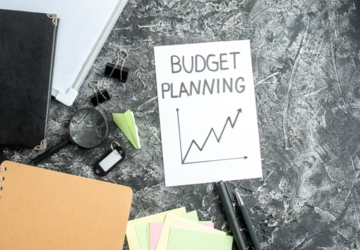Managing your finances can be daunting, mainly if you're not used to keeping track of your expenses. However, creating a budget and sticking to it can help you achieve your financial goals and reduce financial stress. We will discuss the top tips for creating and sticking to a budget.
Creating and sticking to a budget requires understanding your income and expenses. Begin by listing all sources of income, including your salary or wages, any freelance work, or investment income. Then, list all your expenses, such as rent, utilities, groceries, and entertainment. Categorize each expense as either a fixed or variable cost. Use this information to determine your monthly expenses and compare them to your income. If your expenses exceed your income, look for areas to cut back. Set realistic goals and prioritize your spending. Track your progress regularly and adjust as needed to ensure you stick to your budget.

Calculating your income is essential in creating and sticking to a budget. Begin by determining your gross income, which is your total income before taxes and deductions. This includes your salary, wages, freelance work, or investment income. Then, subtract any pre-tax deductions, such as health insurance or retirement contributions. The result is your net income or take-home pay. Use this information to determine your monthly income and compare it to your expenses. If your expenses exceed your income, look for areas to cut back. Setting realistic goals and prioritizing your spending can help you create a budget you can stick to.
Tracking your expenses is crucial for creating and sticking to a budget. Begin by recording all your expenses, including your fixed and variable costs. You can utilize a budgeting application or a spreadsheet to simplify the process. Categorize your expenses by type and track your spending regularly. This will give you an correct picture of where your money is going and help you identify areas where you can cut back. Use this information to create a realistic budget that reflects your income and expenses. Regularly tracking your expenses and adjusting your budget will help you stay on track and achieve your financial goals.
Identifying short-term and long-term financial goals is important when creating and sticking to a budget. Short-term goals might include paying off credit card debt or saving for a vacation, while long-term goals might include saving for retirement or buying a home.
When creating a budget, it's important to set realistic financial goals. This means considering your income and expenses and setting achievable goals that you can work towards. Unrealistic goals can lead to frustration and make it harder to stick to your budget.
Prioritizing your financial goals is key to creating and sticking to a budget. Determine which goals are most important to you and allocate your money accordingly. This might mean paying off high-interest debt before saving for a vacation or spending extra money on retirement savings.
Once you understand your income, expenses, and financial goals, you can create a budget that works for you. Here are the steps to creating a budget:
To create a budget, you need to determine your monthly income. This includes your total income before taxes and deductions, such as your salary, wages, freelance work, or investment income. Subtract any pre-tax deductions to determine your net income or take-home pay.
List all your expenses, including fixed expenses like rent or mortgage payments and variable expenses like groceries and entertainment.
Categorizing your expenses is important in creating and sticking to a budget. Divide your expenses into fixed and variable costs and further categorize them by types, such as housing, transportation, food, entertainment, and debt payments. This approach can enable you to recognize the areas where you can reduce expenses.
Setting spending limits is crucial when creating and sticking to a budget. Once you have determined your income and expenses, set realistic spending limits for each category. This can assist you in remaining within your financial plan and accomplishing your monetary objectives. Remember to modify your limits as required. Remember to adjust your limits as needed.
Tracking your spending is essential when creating and sticking to a budget. Keep a record of all your expenses and categorize them by type. Regularly review your spending to ensure that you are staying within your budget and identify areas where you can cut back.
Sticking to your budget can be challenging, but there are things you can do to make it easier. Here are some tips for sticking to your budget:
Using a budgeting app can be helpful when creating and sticking to a budget. There are many apps available that can help you track your income and expenses, set spending limits, and monitor your progress toward your financial goals. Choose an app that works for you and use it regularly.

Avoiding impulse purchases is important when creating and sticking to a budget. Before making a purchase, ask yourself if it's something you really need or if it's a want. Consider if it fits into your budget and if it's a priority compared to other financial goals. Avoid making impulse purchases that can throw off your budget.
When creating and sticking to a budget, it's important to look for ways to save money. One way to save money is to shop for deals and discounts, use coupons or promo codes, and take advantage of sales. Another way is to buy items in bulk or purchase generic brands instead of name-brand products. Additionally, you can negotiate bills, such as your internet or phone bill, to try to get a better rate. Reflect on reducing non-essential expenses, such as dining at restaurants or using subscription services, and search for free or low-priced substitutes. Be creative and resourceful in finding ways to save money and achieve your financial goals.
Rewarding yourself for saving money can be a great way to stay motivated and stick to your budget. Consider setting up a reward system for yourself, such as treating yourself to a nice meal or buying a small item you've wanted when you reach certain milestones in your savings goals. This can help you feel more positive about your progress and encourage you to continue making smart financial choices. However, be sure to keep your rewards within your budget and avoid overspending or splurging on unnecessary items. Remember, the ultimate reward of saving money is achieving your financial goals and feeling more financially secure.